The NVIDIA GeForce GTX 750 Ti and GTX 750 Review: Maxwell Makes Its Move
by Ryan Smith & Ganesh T S on February 18, 2014 9:00 AM ESTPower, Temperature, & Noise
As always, last but not least is our look at power, temperature, and noise. Next to price and performance of course, these are some of the most important aspects of a GPU, due in large part to the impact of noise. All things considered, a loud card is undesirable unless there’s a sufficiently good reason – or sufficiently good performance – to ignore the noise.
| GeForce GTX 750 Series Voltages | ||||
| Ref GTX 750 Ti Boost Voltage | Zotac GTX 750 Ti Boost Voltage | Zotac GTX 750 Boost Voltage | ||
| 1.168v | 1.137v | 1.187v | ||
For those of you keeping track of voltages, you’ll find that the voltages for GM107 as used on the GTX 750 series is not significantly different from the voltages used on GK107. Since we’re looking at a chip that’s built on the same 28nm process as GK107, the voltages needed to drive it to hit the desired frequencies have not changed.
| GeForce GTX 750 Series Average Clockspeeds | |||||
| Ref GTX 750 Ti | Zotac GTX 750 Ti | Zotac GTX 750 | |||
| Max Boost Clock |
1150MHz
|
1175MHz
|
1162MHz
|
||
| Metro: LL |
1150MHz
|
1172MHz
|
1162MHz
|
||
| CoH2 |
1148MHz
|
1172MHz
|
1162MHz
|
||
| Bioshock |
1150MHz
|
1175MHz
|
1162MHz
|
||
| Battlefield 4 |
1150MHz
|
1175MHz
|
1162MHz
|
||
| Crysis 3 |
1149MHz
|
1174MHz
|
1162MHz
|
||
| Crysis: Warhead |
1150MHz
|
1175MHz
|
1162MHz
|
||
| TW: Rome 2 |
1150MHz
|
1175MHz
|
1162MHz
|
||
| Hitman |
1150MHz
|
1175MHz
|
1162MHz
|
||
| GRID 2 |
1150MHz
|
1175MHz
|
1162MHz
|
||
| Furmark |
1006MHz
|
1032MHz
|
1084MHz
|
||
Looking at average clockspeeds, we can see that our cards are essentially free to run at their maximum boost bins, well above their base clockspeed or even their official boost clockspeed. Because these cards operate at such a low TDP cooling is rendered a non-factor in our testbed setup, with all of these cards easily staying in the 60C or lower range, well below the 80C thermal throttle point that GPU Boost 2.0 uses.
As such they are limited only by TDP, which as we can see does make itself felt, but is not a meaningful limitation. Both GTX 750 Ti cards become TDP limited at times while gaming, but only for a refresh period or two, pulling the averages down just slightly. The Zotac GTX 750 on the other hand has no such problem (the power savings of losing an SMX), so it stays at 1162MHz throughout the entire run.
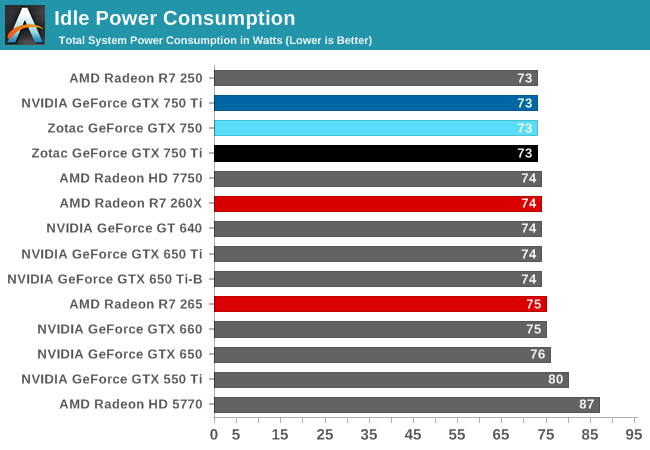
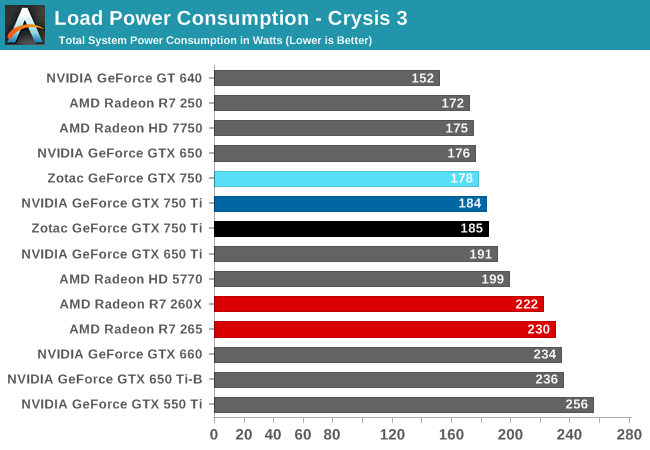
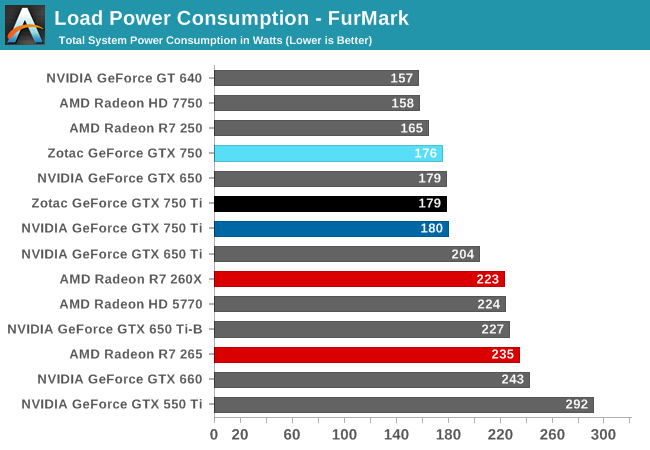
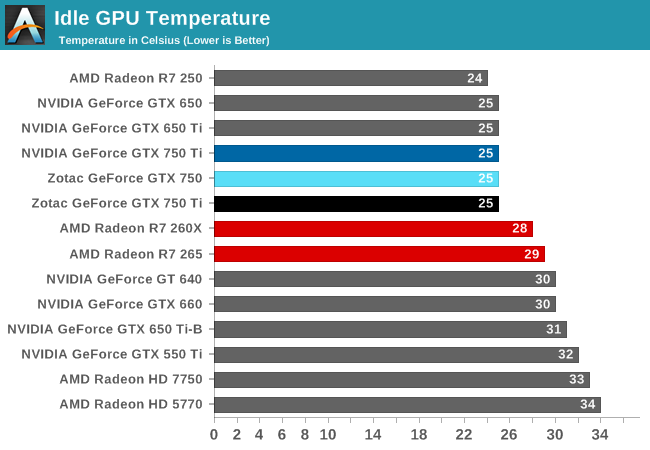
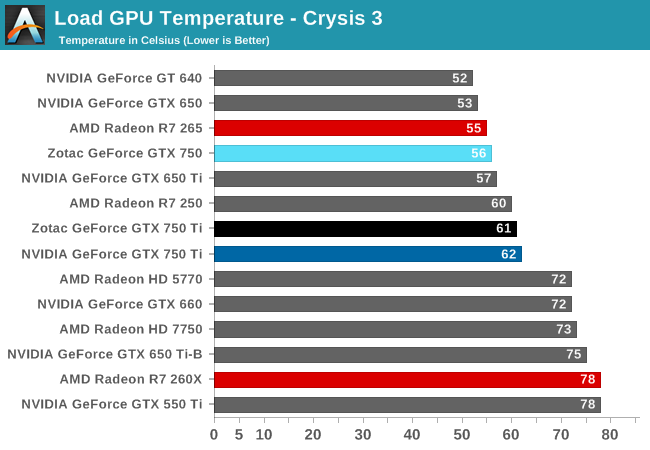
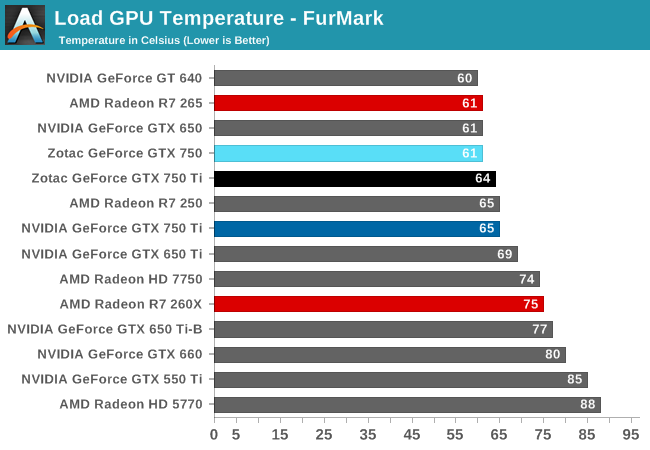
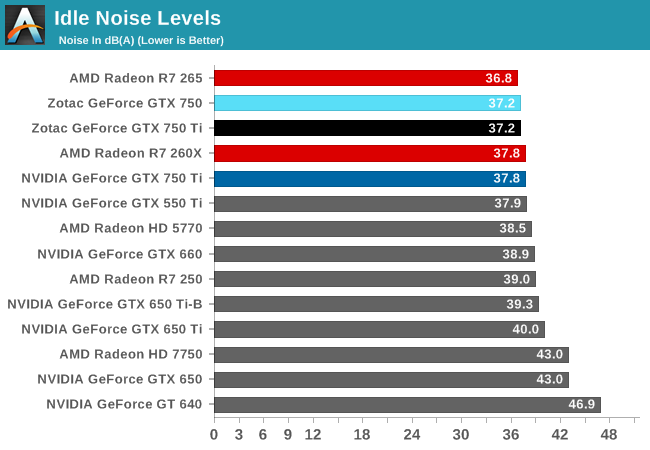
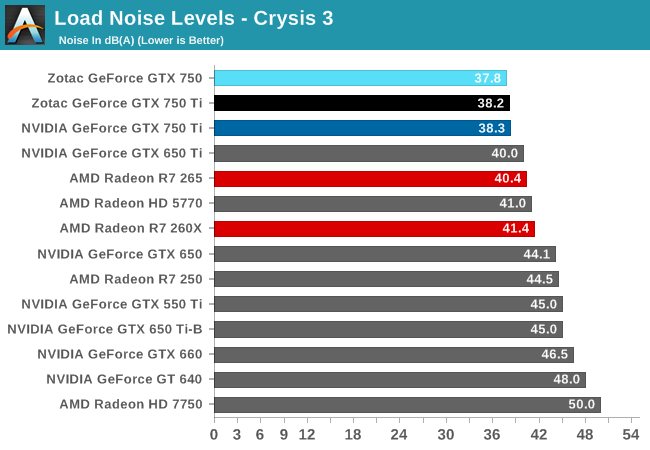
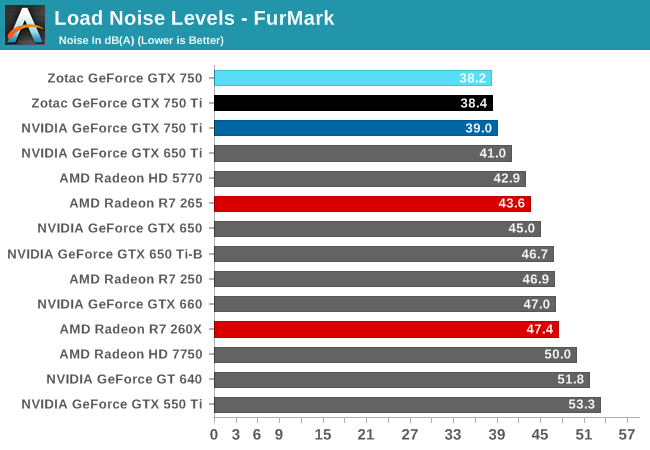










177 Comments
View All Comments
TheinsanegamerN - Tuesday, February 18, 2014 - link
Look at sapphire's 7750. superior in every way to the 6570, and is single slot low profile. and overclocks like a champ.dj_aris - Tuesday, February 18, 2014 - link
Sure but it's cooler is kind of loud. Definitely NOT a silent HTPC choice. Maybe a LP 750 would be better.evilspoons - Tuesday, February 18, 2014 - link
Thanks for pointing that out. None of my local computer stores sell that, but I took a look on MSI's site and sure enough, there it is. They also seem to have an updated version of the same card being sold as an R7 250, although I'm not sure there's any real difference or if it's just a new sticker on the same GPU. Clock speeds, PCB design, and heat sink are the same, anyway.Sabresiberian - Tuesday, February 18, 2014 - link
I'm hoping the power efficiency means the video cards at the high end will get a performance boost because they are able to cram more SMMs on the die than SMXs were used in Kepler solutions. This of course assumes the lower power spec means less heat as well.I do think we will see a significant performance increase when the flagship products are released.
As far as meeting DX11.1/11.2 standards - it would be interesting to hear from game devs how much this effects them. Nvidia has never been all that interested in actually meeting all the requirements for Microsoft to give them official status for DX versions, but that doesn't mean the real-world visual quality is reduced. In the end what I care about is visual quality; if it causes them to lose out compared to AMD's offerings, I will jump ship in a heartbeat. So far that hasn't been the case though.
Krysto - Tuesday, February 18, 2014 - link
Yeah, I'm hoping for a 10 Teraflops Titan, so I can get to pair with my Oculus Rift next year!Kevin G - Tuesday, February 18, 2014 - link
nVidia has been quite aggressive with the main DirectX version. They heavily pushed DX10 back in day with the Geforce 8000/9000 series. They do tend to de-emphassize smaller updates like 8.1, 10.1, 11.1 and 11.2. This is partially due to their short life spans on the market before the next major update arrives.I do expect this to have recently changed as Windows it is moving to rapid release schedule and it'll be increasingly important to adopt these smaller iterations.
kwrzesien - Tuesday, February 18, 2014 - link
Cards on Newegg are showing DirectX 11.2 in the specs list along with OpenGL 4.4. Not that I trust this more than the review - we need to find out more.JDG1980 - Tuesday, February 18, 2014 - link
The efficiency improvements are quite impressive considering that they're still on 28nm. TDP is low enough that AIBs should be able to develop fanless versions of the 750 Ti.The lack of HDMI 2.0 support is disappointing, but understandable, considering that it exists virtually nowhere. (Has the standard even been finalized yet?) But we need to get there eventually. How hard will it be to add this feature to Maxwell in the future? Does it require re-engineering the GPU silicon itself, or just re-designing the PCB with different external components?
Given the increasing popularity of cryptocoin mining, some benchmarks on that might have been useful. I'd be interested to know if Maxwell is any more competitive in the mining arena than Kepler was. Admittedly, no one is going to be using a GPU this small for mining, but if it is competitive on a per-core basis, it could make a big difference going forward.
xenol - Tuesday, February 18, 2014 - link
I'm only slightly annoyed that NVIDIA released this as a 700 series and not an 800 series.DanNeely - Tuesday, February 18, 2014 - link
I suspect that's an indicator that we shouldn't expect the rest of the Maxwell line to launch in the immediate future.